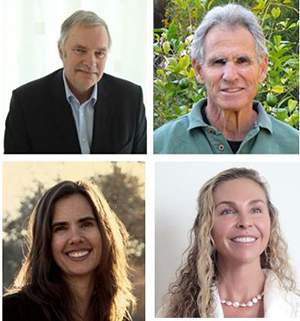I attended my first meditation retreat in Thailand 17 years ago. When I arrived, I didn’t know very much about mindfulness and I certainly didn’t speak any Thai. At the monastery, I vaguely understood the teachings of the beautiful Thai monk who instructed me to pay attention to the breath coming in and out of my nostrils. It sounded easy enough. So I sat down and attempted to pay attention, 16 hours a day, and very quickly I had my first big realization: I was not in control of my mind.
I was humbled and somewhat distraught by how much my mind wandered. I would attend to one breath, two breaths, maybe three—and then my mind was gone, lost in thoughts, leaving my body sitting there, an empty shell. Frustrated and impatient, I began to wonder, “Why can’t I do this? Everyone else looks like they’re sitting so peacefully. What’s wrong with me?”
On the fourth day, I met with a monk from London, who asked how I was doing. It was the first time I had spoken in four days, and out of my mouth came a deluge of the anxieties I had been carrying around with me. “I’m a terrible meditator. I can’t do it. I am trying so hard, and every time I try harder, I get even more tangled up. Meditation must be for other, more spiritual, calmer kinds of people. I don’t think this is not the right path for me.”
He looked at me with compassion and a humorous twinkle in his eye. “Oh dear, you’re not practicing mindfulness,” he told me. “You are practicing impatience, judgment, frustration, and striving.” Then he said five words that profoundly affected my life: “What you practice becomes stronger.” This wisdom has now been well documented by the science of neuroplasticity, which shows that our repeated experiences shape our brains.
The monk explained to me that mindfulness is not just about paying attention, but also about how you pay attention. He described a compassionate, kind attention, where instead of becoming frustrated when my mind wandered, I could actually become curious about my mind meandering about, holding this experience in compassionate awareness. Instead of being angry at my mind, or impatient with myself, I could inquire gently and benevolently into what it felt like to be frustrated or impatient.

Shauna Shapiro will join Jon Kabat-Zinn on March 8, 2013, to discuss mindfulness and compassion. Seats are sold out; register now to view the Live Webcast. (Photo: Clockwise from top right: Jon Kabat-Zinn, Shauna Shapiro, Kristin Neff, and Paul Gilbert.)
In this way, I began to cultivate kindness toward myself, as well as a sense of interest and curiosity for my lived experience. I started to practice infusing my attention with care and compassion, similar to a parent attending to a young child, saying to myself, “I care about you. I’m interested. Tell me about your experience.”
Understanding this connection between mindfulness and compassion has been transformational, helping me embrace myself and my experience with greater kindness and care. It has also deeply informed my clinical and academic work. In my writing and research, I’ve explicitly articulated a model of mindfulness that includes the attitudes of how we pay attention. Instead of trying to control or judge our experience, we take an interest in it with attitudes of compassion and openness. We are cultivating awareness, yes, but it is important to acknowledge the human dimension of that awareness. It is not a sterile, mechanical awareness. Rather, it is a kind, curious, and compassionate awareness.
Research has started to document empirical evidence of this connection between mindfulness and compassion, consistently finding over the past two decades that mindfulness increases empathy and compassion for others and for oneself.
For example, in my first research publication, published in the Journal of Behavioral Medicine in 1998, we found that Jon Kabat-Zinn’s eight-week Mindfulness-Based Stress Reduction (MBSR) program significantly increased empathy in medical students.
Another study that my colleagues and I conducted, published in the International Journal of Stress Management in 2005, concluded that MBSR training increased self-compassion in health care professionals. More recently, we examined the impact of mindfulness training on counseling psychology students and discovered that it significantly increased self-compassion—which, in turn, led to declines in stress and negative emotion and increases in positive emotion.
Basically, the research shows that mindfulness increases empathy and compassion for others and for oneself, and that such attitudes are good for you. To me, that affirms that when we practice mindfulness, we are simultaneously strengthening our skills of compassion—evidence that mindfulness isn’t simply about sharpening attention.
Yet what we don’t know is precisely how mindfulness produces these positive effects. Answering this question is an important next step for future research and exploration, so that we can better understand the precise elements and active ingredients essential to mindfulness training.
Although there is not much research focused specifically on how mindfulness helps us cultivate compassion and empathy, I can offer some ideas, based on my years of research and practice and discussions with other experienced meditators.
First, as I explain above, I believe truly practicing mindfulness helps us learn how to become more compassionate toward ourselves—which, evidence suggests, is intertwined with being more compassionate toward others. One study I often cite, especially when teaching psychotherapists and students who are training to become therapists, demonstrates that how we treat ourselves is highly correlated with how we treat others: When therapists rated how compassionate they were with themselves versus how critical and self-blaming, their ratings correlated highly with how they related to their patients.
It’s just as the wise monk from London taught me years ago: What we practice becomes stronger. If you think about it, we are relating to ourselves 24 hours a day—we are practicing this way of relating constantly. So if mindfulness truly does, as I believe, involve a kind, open, curious attitude toward yourself, it builds the self-compassion that helps foster compassion toward others. That’s why I tell my students, “Cultivate self-compassion—do it for your future patients!”
I think it is important to clarify, however, that self-compassion doesn’t mean we are always filled with happiness and lovingkindness. Simply put, what it means is that our awareness of what’s happening is always kind, always compassionate. So even if I’m feeling angry or frustrated, I am embracing my experience with a compassionate awareness. When we begin to welcome our experience in this way, we are better able to be with it, see it clearly, and respond appropriately to it—and, research suggests, we’ll be strengthening the skills that help us extend compassion toward others.
In this way, I like to think of mindfulness as a big cooking pot. I put all of my experiences into this pot. This pot is always kind, always welcoming, even if the stuff I put into it is not (e.g., anger, sadness, confusion). I cook all of it—the pain, the confusion, the anger, the joy—steadily, consistently holding it in this kind, compassionate pot of mindfulness. By relating to my experiences in this way, I am better able to digest and receive nourishment from them, just as when you put a raw potato in a pot and cook it for many hours, it becomes tasty and nourishing.
Another way that mindfulness cultivates compassion is that it helps us see our interconnectedness. For example, let’s say that the left hand has a splinter in it. The right hand would naturally pull out the splinter, right? The left hand wouldn’t say to the right hand, “Oh, thank you so much! You’re so compassionate and generous!” The right hand removing the splinter is simply the appropriate response—it’s just what the right hand does, because the two hands are part of the same body.
The more you practice mindfulness, the more you begin to see that we’re all part of the same body—that I as the right hand actually feel you, the left hand’s pain, and I naturally want to help. Mindfulness cultivates this interconnectedness and clear seeing, which leads to greater compassion and understanding of the mysterious web in which we all are woven.
A third reason mindfulness appears to cultivate empathy and compassion is that it guards against the feelings of stress and busyness that make us focus more on ourselves and less on the needs of other people.
This was famously demonstrated in the classic Good Samaritan experiments conducted by John Darley and Daniel Batson in the 1970s. Darley and Batson assigned seminary students at Princeton University to deliver a talk on the Good Samaritan. While on their way to their presentation, the students passed someone (working with the researchers) who was slumped over and groaning. The researchers tested all kinds of variables to see what might make the students stop to help, but only one variable mattered: whether or not the students were late for their talk. Only 10 percent of the students stopped to help when they were late; more than six times as many helped when they were not in a hurry.
This study suggests that people are not inherently morally insensitive, but when we’re stressed, scared, hurried, it’s easy to lose touch with our deepest values. By helping us stay attuned to what’s happening around us in the present moment, regardless of the time, mindfulness helps us stay connected to what is most important. As the Zen monk Suzuki Roshi teaches, “The most important thing is to remember the most important thing.”
For me, the most important thing is to continue to explore, with an open heart and mind, what mindfulness truly is, and help illuminate how it can be of greatest benefit. We clearly do not have all the answers yet; I think what is most interesting is to ask the questions. As Rilke said, “Have patience with everything unresolved in your heart and try to love the questions themselves.”
The exploration of mindfulness requires great sensitivity and a range of methodological glasses. Our science—and our lives—will benefit by looking through all of them, illuminating the richness and complexity of mindfulness.
This article was reprinted with permission from the Greater Good Science Center. View the original article.






